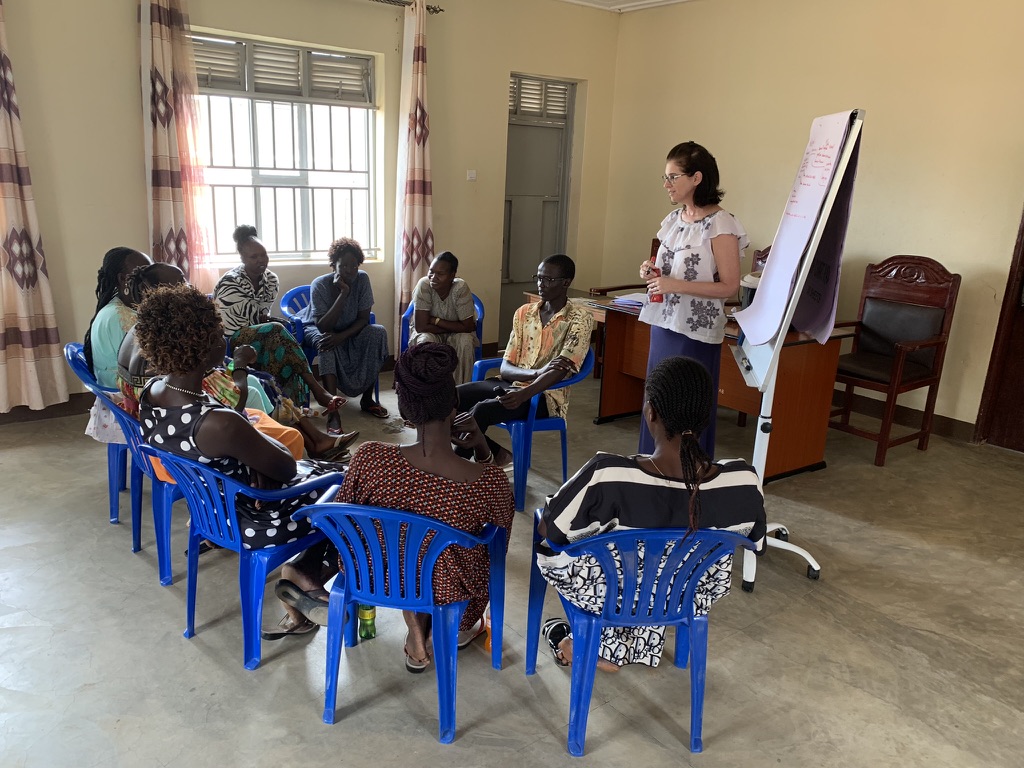news
“We are always learning:” GGC Fulbright Scholar returns from year in Uganda

Dr. MaryBeth Chrostowsky, is back in her Georgia Gwinnett College (GGC) classroom this semester after spending a year in the African nation of Uganda under a prestigious Fullbright Scholar Award.
A senior lecturer in anthropology, Chrostowsky spent the year working with graduate students in the Refugee and Migrant Studies Program at Ugandan Martyrs University in Kampala. She returns with a wealth of knowledge and experience she is excited to share with her GGC students.
“Living for an extended time with a community allowed me to learn new languages and develop a nuanced understanding of the culture,” she said. “These experiences and the stories I share with my students provide exciting and sometimes amusing teaching aids.”
Chrostowsky split her work weeks in Uganda between teaching and doing fieldwork. She lived on campus in a guesthouse, so her office was near her classroom. She shared her office with other professors, which she enjoyed because they would take walks together some evenings.
One of the biggest challenges was the lack of reliable power and Internet.
“It was common for the power to go out. The campus had a generator, but sometimes it would take time for it to turn on, or was out of gas,” she said. “The Internet would regularly go off and on. Often, when the Internet was working, the network was weak, making doing a simple Google search or sending an email painfully frustrating, but I adapted to that reality.”
Chrostowsky said reliable Internet and a daily hot shower were probably the things she missed most, but otherwise, a typical day teaching in Uganda was not so different than a day teaching in the U.S.
Her days doing fieldwork were another thing entirely.
She conducted her research in the West Nile region of Uganda and used the public bus system to get there. She said the buses were not air-conditioned, and most were old with uncomfortable seats, and the passengers were stuffed into them like sardines.
“The route to my field study was only about 40 percent paved, making for a long, hot, bumpy, and dusty 10-hour ride to my first stop and one of my two sites,” she said. “The second site was a refugee resettlement that took four hours one way on an unpaved, poorly maintained road with dips and large holes. When it rained, the roads were covered in water and mud, making the journey longer as we were bound to be stuck at least once.”
Chrostowsky said what surprised her most was the degree of difference between the U.S. and Ugandan higher education systems.
“I understood and expected formal education to vary worldwide because it is informed by cultural practices, values and beliefs, but I did not expect the degree of difference I encountered,” she said.
One big difference was the age of her graduate students because most Ugandans do not have the privilege of going to graduate school immediately after attaining their bachelor’s degree. Due to cultural and social pressure to get married and have children, they wait many years before attending graduate school.
Another difference is that there are no government student loans available in Uganda like there are in the U.S.
“Because of their duties to their families, maybe even to their parents, it takes time to save up for the tuition,” said Chrostowsky. “Uganda is a developing nation, so attending university or grad school is extraordinary. It often takes multiple family members to raise the money needed for school fees.”
Chrostowsky is happy to say she accomplished her three main goals during her residency:
- As a course instructor, sharing her knowledge of U.S. refugee law and the everyday challenges refugees face once they arrive in the U.S.
- Carrying out her research project to examine how kinship functions as a resource for displaced people from the Dinka tribe.
- Creating working relationships with Ugandan scholars.
She said her most significant win was the mentorship she provided to her students – proudly noting she is now the chair for one of her Ugandan student’s master’s research thesis – and her biggest takeaway from the year is that, “We are always learning. Even when we think we understand it all, we don’t.”
Back at GGC, she is sharing her experiences with her students.
“She loves what she does, and I like that she fully immersed herself in a different culture,” said Tree Johnson, a freshman. “It has been a whole new eye-opening experience for me.”
For freshman classmate Jyqua Esther, the anthropology class is more than he expected.
“Dr. C is so animated and interesting,” he said. “I liked learning how she adapted to their culture – eating and dressing like them.”
Chrostowsky wants to encourage other faculty to consider applying to the Fulbright Scholar program.
“This experience abroad will make you a stronger teacher, researcher and mentor. I wish it for everyone.”
View and download Uganda experience gallery photos and b-roll.
